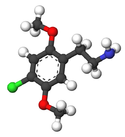2C-C
 |
|||
|
|
|||
| Names | |||
|---|---|---|---|
|
Preferred IUPAC name
2-(4-Chloro-2,5-dimethoxyphenyl)ethan-1-amine
|
|||
| Other names
(4-Chloro-2,5-dimethoxyphenethyl)amine
|
|||
| Identifiers | |||
|
3D model (Jmol)
|
|||
| ChemSpider | |||
|
PubChem CID
|
|||
| UNII | |||
|
|||
|
|||
| Properties | |||
| C10H14ClNO2 | |||
| Molar mass | 215.6778 g/mol | ||
| Melting point | 220 to 221 °C (428 to 430 °F; 493 to 494 K) (hydrochloride) | ||
|
Except where otherwise noted, data are given for materials in their standard state (at 25 °C [77 °F], 100 kPa).
|
|||
|
|
|||
| Infobox references | |||
2C-C is a psychedelic drug of the 2C family. It was first synthesized by Alexander Shulgin, sometimes used as an entheogen. In his book PiHKAL (Phenethylamines i Have Known And Loved), Shulgin lists the dosage range as 20–40 mg. 2C-C is usually taken orally, but may also be insufflated. 2C-C is schedule I of section 202(c) of the Controlled Substances Act in the United States, signed into law as of July, 2012 under the Food and Drug Administration Safety and Innovation Act.
Not much information is known about the toxicity of 2C-C.
As of October 2015 2C-C is a controlled substance in China.
As of October 31, 2016; 2C-C is a controlled substance (Schedule III) in Canada. http://gazette.gc.ca/rp-pr/p2/2016/2016-05-04/html/sor-dors72-eng.php
2C-C is a Anlage I controlled drug.
Sveriges riksdags health ministry classified 2C-C as "health hazard" under the act (translated Act on the Prohibition of Certain Goods Dangerous to Health) as of Mar 1, 2005, in their regulation SFS 2005:26 listed as 2,5-dimetoxi-4-klorfenetylamin (2C-C), making it illegal to sell or possess.
As of July 9, 2012, in the United States 2C-C is a Schedule I substance under the Food and Drug Administration Safety and Innovation Act of 2012, making possession, distribution and manufacture illegal.
...
Wikipedia


